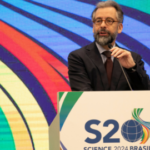G20 Science Summit Recommends More “Green AI” and Attention to Diseases in Climate Crisis
From the blog Just One Planet, Brazil, July 1st
The S20, a collective of researchers from the science academies of the G20 (group of the 20 largest economies in the world), is presenting a series of recommendations to the political leaders of the member countries of the economic summit this Tuesday (2). Climate change permeates the various axes of analysis by the scientists, who warn of the limited use of artificial intelligence to boost biodiversity and the danger that global warming poses to the health of the world population.
From today, the group will be meeting in Rio de Janeiro for the final adjustments to the letter, an event presided over by the Brazilian Academy of Sciences. The blog Um Só Planeta (Just One Planet) had access to the draft document, which outlines the agreements made so far among the G20 scientific community, with potential changes to the final declaration to be released.
Green Artificial Intelligence
“The ethical use of AI must prioritize human well-being and environmental sustainability,” states the document. In the scientists’ recommendation, the leaders of the world’s largest economies should pay more attention to the role of technology, especially in critical areas such as health, education, and climate change.
Among the risks of improper AI exploitation, researchers warn of the exacerbation of social inequalities, as well as the significant energy and water consumption needed to support data centers, where the computers that process the information used by platforms like ChatGPT are located.
“Despite various initiatives, progress in utilizing AI for sustainable development has been limited, indicating the need for reassessment and greater efforts,” the letter states.
Health Challenges
Addressing the impacts of climate and the environment on health is one of the axes analyzed by scientists in the document. In the analysis to be presented to political leaders, the group considers climate and environmental changes, along with biodiversity loss and pollution, as sources of direct and indirect impacts on health and social sustainability.
“These factors affect agricultural production, food prices, and access to water and air quality,” highlights the letter, noting that low- and middle-income countries tend to suffer the most damage.

Hall where the S20 debates are being held in Rio de Janeiro, with representatives from the Academies of the G20 countries | Photo: Julio César Guimarães
According to the group of academics, rising global temperatures and unpredictable climate patterns create conditions that favor the spread of zoonotic diseases (transmitted between animals and humans) and arboviral diseases (mainly transmitted by mosquitoes), increasing transmission risks.
“The G20 nations should establish a climate and health fund to coordinate resources, support vulnerable populations during extreme conditions, and develop climate-resilient health systems to better prepare for climate-related crises,” the document warns. Resources to guarantee environmental rights are also among the recommendations.
Energy Transition
The draft of the S20 final declaration signals a focus on increasing the contribution of renewable energies, “for their rapid deployment and long-term possibilities.” The endorsement follows the resolution of the last UN Climate Summit, last year, in which member countries committed to tripling the supply of clean energy by 2030.
“Carbon capture, utilization, and storage are crucial to minimizing CO2 emissions from fossil fuels as we move away from these sources towards a fully decarbonized energy future. Biofuels and hydrogen offer additional benefits, particularly for sectors such as transportation and heavy industry,” argue the researchers.
The group emphasizes the social importance of energy, advocating that everyone should have access to sustainable, clean, affordable, and reliable energy, which contributes to improving poverty indices in nations, including job creation and environmental justice.
Bioeconomy
In the S20’s view, the bioeconomy, an economic system that prioritizes the sustainable use of natural resources, is essential to tackling climate change, biodiversity loss, and the depletion of the planet’s resources.
“Strengthening the protection of natural resources, investing in ecological restoration, enhancing innovations in biogenic raw materials, among other things, are crucial to promoting economic growth and mitigating climate change,” the group’s scientists affirm. The S20 also highlights the path of international cooperation for synergy of knowledge and programs that improve quality of life and protect natural resources on a global scale.




